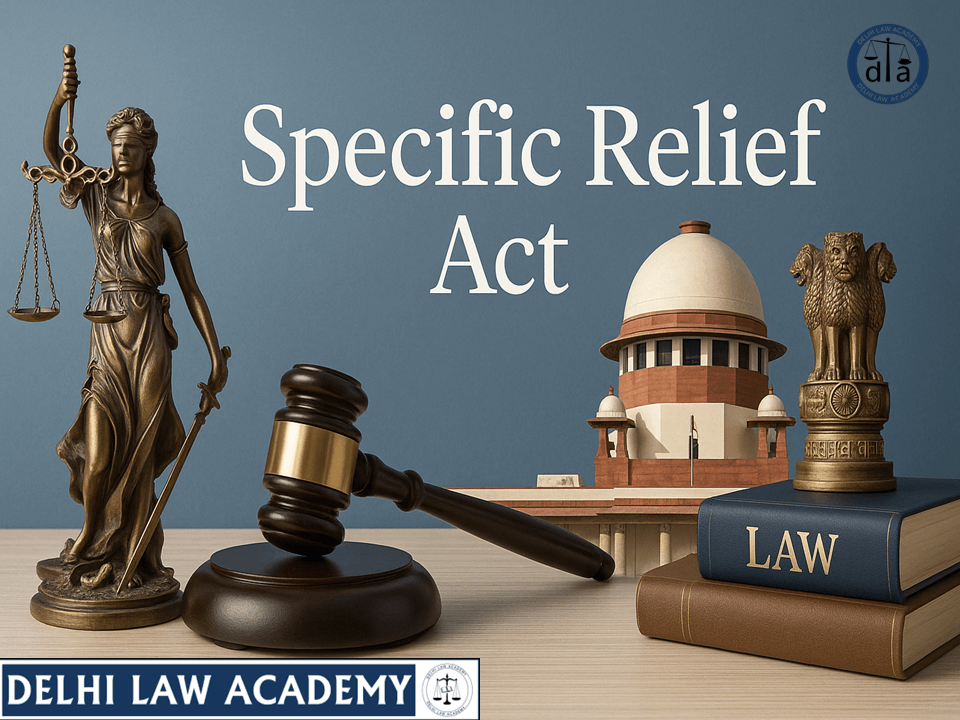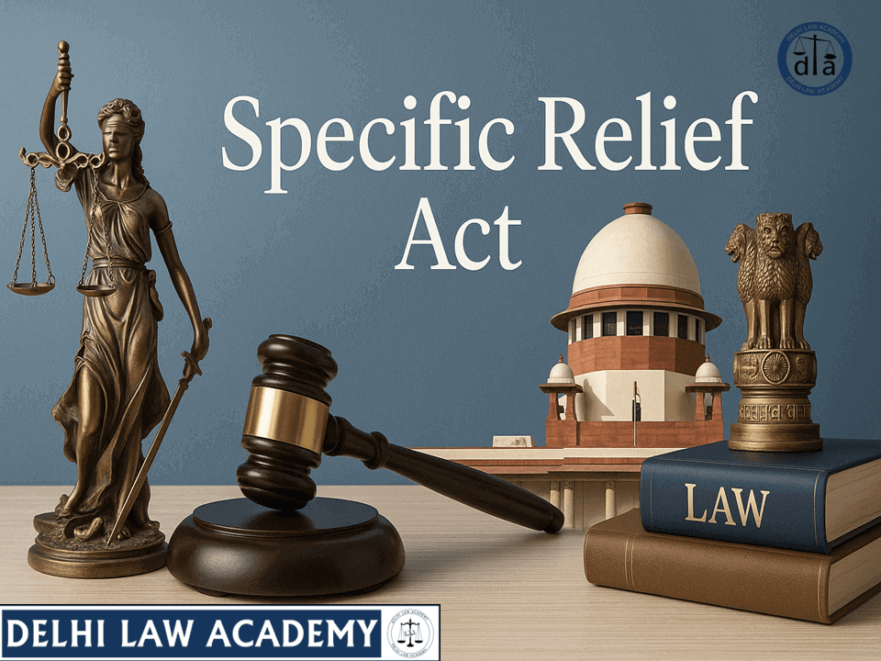
⚖️ SUPREME COURT ON SPECIFIC PERFORMANCE OF AGREEMENT TO SELL
📘 Sughar Singh v. Hari Singh [2021 SC]
“Not to grant the decree of specific performance despite the execution of the agreement to sell is proved; part sale consideration is proved and the plaintiff is always ready and willing to perform his part of the contract would encourage the dishonesty.”
Delhi Law Academy Jaipur presents below for aspirants of Rajasthan Judicial Service (RJS), DJS, PCS (J) and other Judicial Services throughout India a very important judgment of the Supreme Court of India in Sughar Singh v. Hari Singh [2021 SC] wherein the Supreme Court granted a decree for specific performance of the agreement to sell.
Presented below: Summarized version [by Delhi Law Academy Jaipur] of the Supreme Court Judgment in the case of Sughar Singh v. Hari Singh [2021] elucidating in which cases a decree for specific performance of the agreement to sell should be granted.
[Original language of the judgment has been maintained; it has not been disturbed or replaced]In this case the Supreme Court granted a decree for specific performance of the agreement to sell holding not granting a decree in such cases would encourage dishonesty.
⚖️ SUGHAR SINGH V. HARI SINGH [2021 SC]
🧾 J U D G M E N T
The appellant–original plaintiff instituted the suit for specific performance of the agreement to sell dated 10.10.1976. The Trial Court as well as the First Appellate Court decreed the suit in favour of the plaintiff.
The High Court in exercise of powers u/s 100 of the CPC has reversed the concurrent findings on readiness and willingness, solely on the ground that there are no specific averments in the plaint which are required as per section 16(c) of the Act. The High Court has also dismissed the suit for specific performance on the ground that the relief of specific performance is the discretionary relief u/s 20 and that even though the execution of the agreement to sell is proved and even the plaintiff was found to be always ready and willing to perform his part of the obligation under the agreement to sell, the decree of specific performance is not automatic and such grant of decree is dependent upon the principles of justice, equity and good conscience.
Having gone through the necessary averments in the plaint it cannot be said that the averments/pleadings lack the requirement of Section 16(c). The necessary averments and pleadings on readiness and willingness read as under:
That the plaintiff has always been and even today, ready and willing to get the sale deed executed and registered and perform his part of the agreement in terms of its terms and conditions and the same is in complete knowledge of the defendant No.1.
It is specifically stated in the deposition that he was ready and willing to perform his part of the obligation in terms of agreement to sell.
Considering the fact that initially payment of Rs.25,000 was made at the time of execution of the agreement to sell and further sum of Rs.15,000 in two instalments were paid at the time when the subsequent two documents were executed for extension of time and even the time was extended at the instance of defendant No.1 and the balance amount of Rs.16,000 was to be paid at the time of execution of the sale deed, it can safely be said that the plaintiff was always ready and willing to perform his part of the contract under the agreement to sell.
Even the observations made by the High Court that Forms 47 and 48 of the Appendix A to the CPC provide for making an averment that the plaintiff has been “and still is ready and willing specifically to perform the agreement on his part” or that “the plaintiff is still ready and willing to pay the purchase money of the said property to the defendant” and that “there is non-compliance of Section 16(c) of the Specific Relief Act and the plaint does not even contain any averment that the plaintiff ever required defendant no.1 to attend the office of the Sub-Registrar to execute the sale deed within time agreed are too technical. The overall circumstances and the conduct on the part of the parties are relevant consideration. The High Court has given unnecessary stress on the word “still”.
Even while proving the readiness and willingness the plaintiff is not required to make any averment that the plaintiff required executant of the agreement to sell to attend the office of the Sub-Registrar to execute the sale deed within the time agreed. In the present case even it was not the case on behalf of the defendants that the plaintiff was not having any means to generate consideration amount.
So far as the observation that even if the agreement is found to be duly executed and the plaintiff is found to be ready and willing to perform his part of the Agreement, grant of decree of specific performance is not automatic and it is a discretionary relief is concerned, the same cannot be accepted and/or approved.
In such a case, many a times it would be giving a premium to the dishonest conduct on the part of the defendant / executant of the agreement to sell. The plaintiff cannot be punished by refusing the relief of specific performance despite the fact that the execution of the agreement to sell in his favour has been established and proved and that he is found to be always ready and willing to perform his part of the contract.
Not to grant the decree of specific performance despite the execution of the agreement to sell is proved; part sale consideration is proved and the plaintiff is always ready and willing to perform his part of the contract would encourage the dishonesty. In such a situation, the balance should tilt in favour of the plaintiff rather than in favour of the defendant–executant of the agreement to sell.
even amendment to the Specific Relief Act by which section 10(a) has been inserted, though may not be applicable retrospectively but can be a guide on the discretionary relief. Now the legislature has also thought it to insert Section 10(a) and now the specific performance is no longer a discretionary relief.
There are concurrent findings of fact that the defendant Nos. 2 to 5 were in knowledge of the agreement to sell in favour of the plaintiff; despite the same they purchased the suit land surreptitiously. For all these years the defendant Nos. 2 to 5 cultivated the suit land and enjoyed the fruits while in possession. The balance must tilt in favour of the plaintiff as plaintiff is deprived of the possession for all these years because of the long- drawn litigation.
The trial Court passed the decree as far as back on 07.02.1987 but because of the appeal before First Appellate Court and thereafter, Second Appeal before the High Court and thereafter a remand order by the High Court and again the decision by the First Appellate Court and thereafter by the High court and the proceeding before this Court, huge time has lapsed, which cannot be to the disadvantage of the plaintiff.
The suit is decreed and there shall be a decree for specific performance of the agreement to sell dated 10.10.1976 in favour of the plaintiff.
**************
📚 Continue Your Specific Relief Act Preparation
Don’t stop here! Strengthen your knowledge of the SRA with our other fully solved tests:
📘 Free Study Material for Judiciary Aspirants!
Download our FREE study material prepared by Delhi Law Academy’s expert faculty.
❓ FAQs on Article 10 of the Indian Constitution
Article 10 of the Constitution ensures that any person who is a citizen of India under Article 5, 6, or 8 will continue to be a citizen, subject to any law made by Parliament. It maintains the continuity of Indian citizenship post-independence.
Article 10 gives Parliament the power to regulate citizenship through legislation. The Citizenship Act of 1955 was enacted under this authority to specify how citizenship can be acquired, lost, or renounced in India.
Article 5 defines who were citizens of India at the commencement of the Constitution, whereas Article 10 ensures the continuity of that citizenship and allows Parliament to regulate future citizenship matters.
Yes, Article 10 applies to all Indian citizens, including those residing abroad, as long as they retain their citizenship under Indian law. However, specific provisions in the Citizenship Act determine how long they can retain it.
While Article 10 itself doesn’t revoke citizenship, it empowers Parliament to make laws that can regulate or terminate citizenship under certain conditions, such as acquiring foreign citizenship or acting against the interests of India.
Article 10 bridges the transition from the original citizenship provisions at independence to ongoing citizenship laws. It ensures that Parliament has constitutional authority to adapt citizenship rules as India evolves.
Contact us
📍 Delhi Law Academy – Jaipur Branch
6C, Tower 2, Coaching Hub, Pratap Nagar, Jaipur – 302033
📞 Phone:
+91 9911916552
+91 8447285606
✉️ Email:
contactus@delhilawacademy.com

